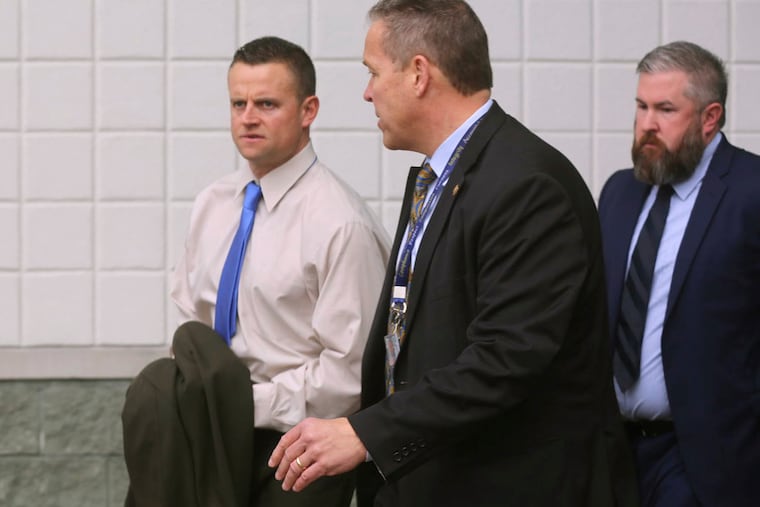Margate firefighter gets eight-year sentence in health care conspiracy case
Thomas Sher chose to go to trial, unlike most of the 50 people who have have been charged in the conspiracy. His brother Michael testified against him.

A federal judge handed down one of his stiffest sentences yet in a vast $50 million prescription drug scheme that has snagged Jersey Shore firefighters, teachers, police officers, doctors and a pizza shop owner, sentencing a Margate firefighter to eight years in prison on Wednesday for his role in the conspiracy.
Thomas Sher, 50, of Northfield, Atlantic County, was sentenced to 96 months in prison after being convicted last September of one count of conspiracy to commit health care fraud and three counts of health care fraud following a 12-day trial before U.S. District Judge Robert B. Kugler in Camden.
Sher chose to go to trial, unlike most of the 50 people who have been charged in the conspiracy. All but four have pleaded guilty or been convicted at trial, according to the U.S. Attorney’s Office. Sher’s brother, John, also a Margate firefighter, was sentenced to 37 months in April.
Another brother, Michael, has also pleaded guilty. Michael Sher testified at his brother’s trial, describing how he recruited him into the scheme he initially thought was legal but later realized “he was going down the rabbit hole.”
Sher’s attorney, Thomas Grimes, did not immediately respond to a request for comment message Thursday morning.
Steven Monaco, a pharmaceutical representative who also chose to go to trial, and was sentenced to 14 years in prison, said Matthew Reilly, spokesperson for the U.S. Attorney’s Office. That was the only longer sentence given out so far in the conspiracy, Reilly said.
Also sentenced Wednesday by Kugler was Christopher Broccoli, 51, of West Deptford, who received 24 months in prison. Broccoli pleaded guilty a year ago to one count of conspiracy to commit health care fraud.
» READ MORE: Former owner of Tony's Baltimore Grill sentenced to 37 months in health care fraud
The scheme involved recruiting state employees with access to the state health care prescription plan to receive medically unnecessary prescriptions for compound medications. Sher and others recruited almost 70 people, the U.S. Attorney’s Office said, leading to $7 million in payouts from the pharmacy benefit plan.
According to the U.S. Attorney’s Office, Sher directly received about $115,000. At the sentencing, prosecutors said, Kugler found that Sher “obstructed justice when he lied during his trial testimony.” The judge also found that he attempted to tamper with witnesses and “devise a cover-up story in advance of trial.”
Broccoli’s guilty plea involved millions of dollars of payouts for the prescription medications, including scar and libido creams and vitamin supplements, for individuals he recruited. Broccoli directly received $150,315.
» READ MORE: Firefighters, cop, pizzeria owner among 7 arrested in Jersey Shore drug fraud ring
The leader of the scheme, William Hickman, of Northfield, pleaded guilty to conspiracy and is set to be sentenced in October.
Hickman, a sales representative for a pharmaceutical company, created a side business called Boardwalk Medical LLC in his wife’s name to sell medical products for other companies, an activity that was prohibited by his employer.
Hickman was named in a search warrant executed in June 2017 at the office of James Kauffman, an endocrinologist who later died by suicide while in prison awaiting trial in the murder of his wife, April. The warrant alleged that Hickman used Boardwalk Medical to solicit the services of Kauffman and other doctors for fraudulent prescriptions for the expensive creams, vitamins, and libido medication, and scar ointments. The prescriptions were reimbursed at the rate of thousands of dollars for a one-month supply, prosecutors said, allowing the proceeds to be distributed up and down the recruiting chain.